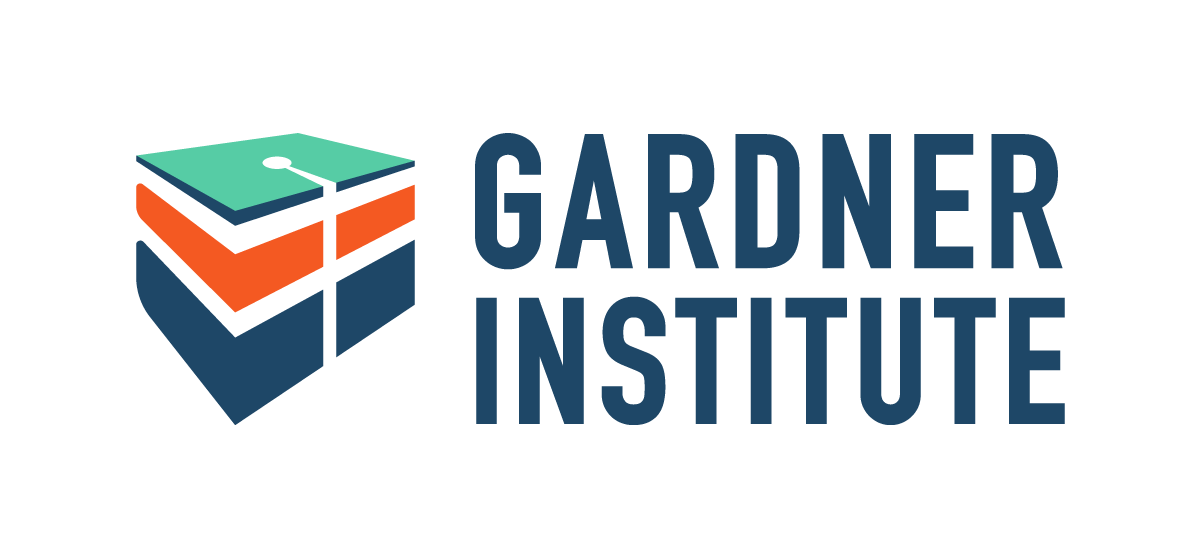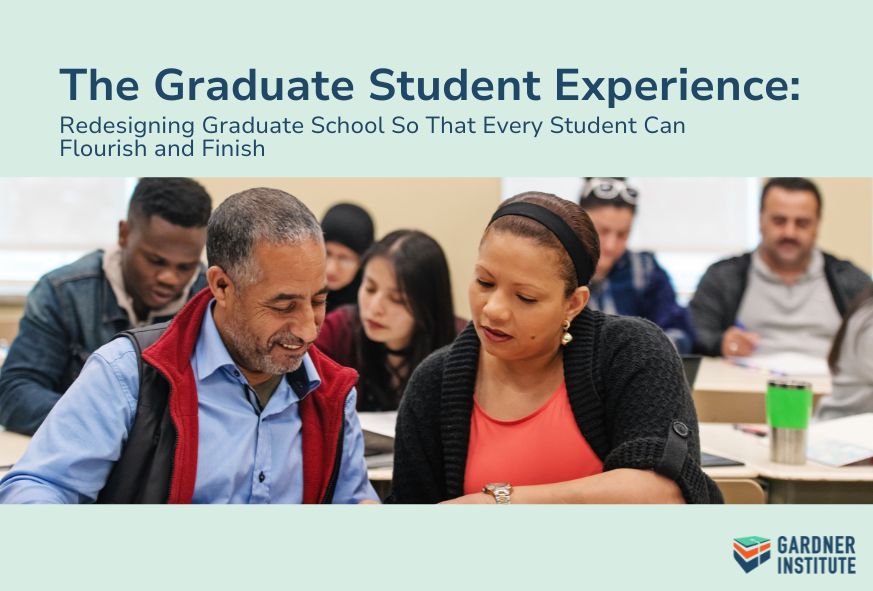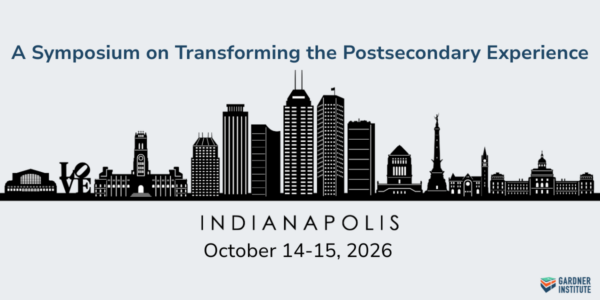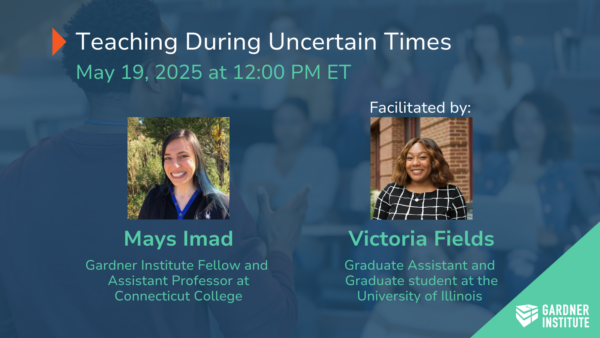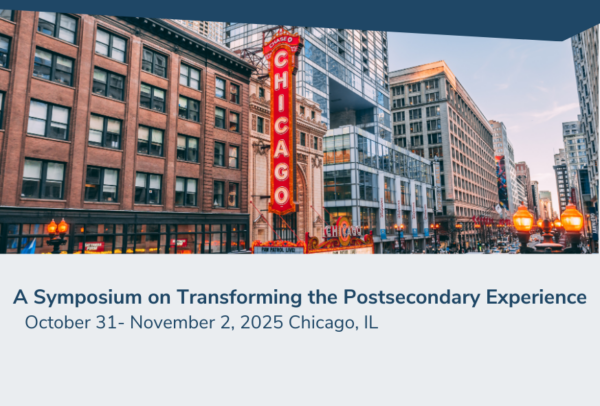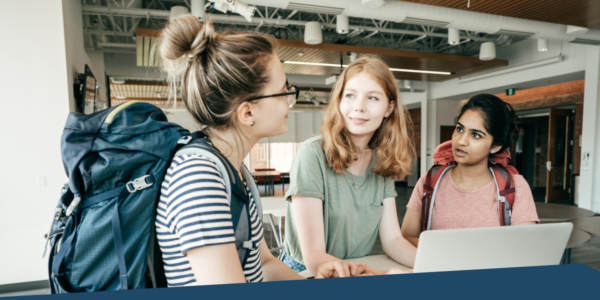The Graduate Student Experience
Redesigning the Graduate Student Experience So More Graduate Students Can Flourish and Finish
October 29-31, 2025
Chicago, IL
We are inviting your participation in the second national convening to discuss improving the graduate school experience to better serve our national interests as provider of the gold standard for global graduate education.
Don’t miss this opportunity to contribute to the future of graduate education.
The Big Why
While undergraduate education has received much attention over the past forty years, with specific focus on concrete ways to increase student success (e.g. “first year experience”), the same attention has not been paid to graduate students. We think it is time for a more deliberate set of efforts to increase student success using a holistic perspective that addresses student retention, progression, and completion rates, mental health and wellbeing, and career preparation. We are inviting your participation in the second, national convening to discuss improving the graduate school experience in order to better serve our national interests as provider of the gold standard for global graduate education.
Call to Action
More students and their families now decide that an undergraduate degree is not enough. A graduate degree is a new “must.” But the challenges facing them have changed. Students face challenges of transition and more debt and personal responsibilities than ever. Our traditional models for graduate school culture and practices were designed for different students and circumstances. We must be a part of the larger American higher education enterprise to improve our outcomes!
The aims of this conference are threefold:
- reduce graduate student attrition and separations,
- increase credential completion, and
- enhance the total student experience, including students’ wellbeing, while strengthening post-graduate outcomes.
Participants will come from roles such as:
- graduate school administrators
- graduate faculty and staff of graduate colleges/schools
- graduate students
- graduate teaching assistants
- graduate and undergraduate academic affairs/student affairs/ student success administrators
- undergraduate student success experts
- undergraduate faculty
- student success researchers in higher education
- foundation program officers
- institutional research, assessment and accreditation liaisons
- state coordinating/governing board staff
Pre- Conference Workshops- October 29
Deliberate Innovation for Higher Educators
Full Day- 9:00 am – 4:00 pm
The way we practice higher education administration is perfectly designed to get the results we are getting now! If we want to change the results, we must change the design. Despite our training, experience, and intentions, many of our approaches are not achieving the desired goals of student success, learning, engagement, retention, graduation, reaffirmation of accreditation, and, for some of us, our institutional viability. We must infuse our work and our personal development with deliberate and systemic innovation. This workshop will offer relevant theories, exercises, introspections, practices, and inspiration, drawn from our experience leading four, year-long cohorts of chief academic officer innovators through a process to enhance their functioning as senior officers who practice deliberate innovation. Higher educators at all levels will emerge with an initial plan to incorporate deliberate innovation into their tactical repertoire in ways that support the systemic improvement of student success.
Who should attend:
Leadership at all levels, Presidents, Chief Academic Officers, Assistant or Associate Vice Presidents, Student Affairs Leaders, or anyone who leads Innovation
Fees: Full Day Pre-conference: $375 (includes breakfast, lunch, all-day beverages, and afternoon snack)
Facilitators:
John Gardner, Vicki McGillin, Brandon Smith, and Felita Williams from the Gardner Institute
A Model for Advancing A Vital Campus-Wide Conversation for Launching Improvement of the Graduate Student Experience
Half Day (1- 4 PM)
It is very understandable that many higher educators, who might well believe in the desirability of their institution undertaking a comprehensive process for improving the graduate student experience, but would appropriately say “Well, yes, but how would we even get started?” “And then if we could get started what would such a process need to entail to increase the likelihood of actually accomplishing positive outcomes and improvements?” That is the focus of this half-day didactic and interactive workshop. Participants will have a process facilitated for them by a higher educator who has developed national and global models for the same kind of exploration and planning for the improvement of the undergraduate experience, especially the foundational year, the so-called “first-year experience.” This workshop will be based on the combination of those experiences and a model presented in a book chapter for a forthcoming book from Johns Hopkins University Press. Admittedly there are both similarities and significant differences in improving outcomes in both of these often quite unconnected components of American and global higher education. Unfortunately, there is no one-size-fits-all model. So this workshop will pose the most important questions and suggestions for developing a custom-made process for any and all institutions in this workshop. Participants will be put through a demanding and stimulating process and be able to emerge with their own model for real application back on campus. Our nation’s 4 million graduate students need their educators to think through and implement a process like this.
Facilitators:
John Gardner, Co-Founder and Executive Chair and Distinguished Professor Emeritus, University of South Carolina
Drew Koch, Chief Executive Officer, Gardner Institute
Building an Accessible Graduate Experience: Supporting Neurodiversity and Mental Health
Half Day (1- 4 PM)
This workshop aims to enhance the accessibility of graduate education by focusing specifically on the needs of neurodivergent students. With the increasing recognition of neurodiversity as a valuable aspect of the academic community, it is crucial to address the unique challenges faced by neurodivergent individuals—those with conditions such as autism, ADHD, dyslexia, and other neurodevelopmental differences, including mental health conditions.
Understanding and supporting neurodivergent students is essential for creating an inclusive academic environment where all students can thrive. Research indicates that neurodivergent graduate students often encounter barriers that hinder their academic success, such as misunderstanding and a lack of appropriate accommodations. This presentation seeks to illuminate these issues, providing insights and strategies to foster a more inclusive graduate experience.
The significance of this topic for conference attendees lies in the growing body of evidence showing that neurodivergent students often face unique challenges in graduate programs. Many institutions have traditionally focused on undergraduate experiences, leaving a gap in understanding the specific needs of neurodivergent graduate students. This oversight can lead to negative academic outcomes and diminished well-being for this population. By addressing these needs, we can work toward a more equitable educational environment.
The session will be interactive, combining discussion, experiential learning, and individual reflection to engage participants fully. Attendees will leave with actionable strategies and a deeper understanding of how to support neurodivergent graduate students, ensuring they have the tools to create an inclusive, accessible, and supportive academic environment where all students can thrive.
Facilitator:
Sara Anne Tompkins, Associate Dean of the Graduate School, Colorado State University
Active Mentoring for Sustaining Graduate Student Success and Resilience
Half Day (1- 4 PM)
The American Council on Education released a report in May 2023 detailing how successful mentoring can lead to positive outcomes for prospective graduate students. Specifically, mentoring can demystify graduate school and potential career pathways, expose students to research, and expand social and professional networks. This interactive workshop will explore numerous mentoring models that can help improve student success, research relationships, and resilience throughout graduate education and beyond. Facilitators will use videos and written case studies to engage participants in group discussions about how to enhance communications, set explicit expectations, resolve conflicts, talk about resilience, and use the interest-based approach when mentoring students. Together, we will explore the importance of context and examine scenarios from the perspectives of administrators, professors, and students. Participants will also be guided on how to use a variety of mentoring resources (synchronous and asynchronous) to enhance mentoring capacity and graduate education success on their campuses and academic units.
Facilitators:
Eric Torng, Associate Dean, Michigan State University; Kirsten Tollefson, Associate Dean, Michigan State University; Rique Campa, Senior Associate Dean, Michigan State University
Providing a Humanistic Approach to Graduate Education: Fostering Identity, Community, and Professional Growth for Graduate Students
Half Day (1- 4 PM)
A significant portion of graduate students do not complete their degree. Estimates range between 40-60% of matriculated graduate students leave their program before they graduate, resulting in negative consequences for students, institutions, and society at large. Many students struggle with financial, academic, and personal challenges that leave them feeling isolated and jeopardize their ability to complete their degree. Unfortunately, many graduate programs either overlook or mistakenly attribute attrition to individual shortcomings of students themselves rather than the inadequacy of the traditional model of graduate education itself. Correspondingly, institutions continue to lose out on their investment and society is denied the contributions from these students. Thus, a new approach to graduate education is needed, one that adopts a humanistic approach to teaching and mentoring graduate students, one which will be experienced by participants in this workshop.
This workshop outlines the origins, evolution, goals, and content of a ten-year old, unique model of professional development that approaches the graduate student experience through a holistic lens to improve student outcomes. Students are not just taught the technical skills necessary for degree completion, they are also taught inter- and intra-personal skills often ignored in traditional graduate education but are critical to professional and personal development. These ‘soft-skills’ not only help to empower students in developing positive academic identities and strong academic communities, but also promote leadership skills that help boost students’ self-awareness, self-confidence, and self-efficacy. While this model was originally developed to support doctoral students, it is grounded in evidence-based practices and can be utilized to support graduate students at any level of graduate education and within any discipline.
During this workshop, participants will be provided a detailed framework and set of resources (e.g., surveys and assessments, seminar topics and activities, etc.) to replicate this type of professional development model, in part or completely, in any graduate school setting to improve outcomes for the graduate students they serve.
Facilitator:
Heather Pfeifer, Executive Director of School of Criminal Justice, University of Baltimore
Plenaries

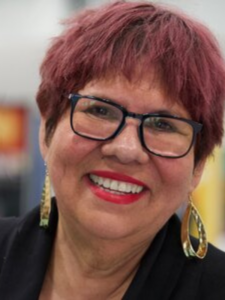
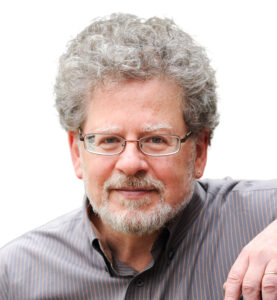
From Transactional to Transformational: A Holistic Approach to Graduate and Professional Student Success
April Perry, PhD, Professor the M.Ed. Higher Education Student Affairs program and Department Head/Chair for Human Services at Western Carolina University
Graduate and Professional (G&P) students face unique challenges that demand intentional, holistic support both inside and outside the classroom. This presentation underscores the importance of bridging gaps in G&P student support, advocating for a shift from transactional services to transformational approaches that foster success and retention. Institutions must expand their commitment to G&P students, ensuring their experiences are not only academically rigorous but also developmentally enriching.
Higher education stakeholders are called to adopt a holistic developmental mindset, emphasizing access and institutional collaboration. To shape the future of G&P education, scholarship must inform practice—both in how institutions support students and how practitioners are trained to serve them effectively. This talk will present actionable strategies in belonging, community-building, and career readiness, along with adapted advising, mentoring, and wellness initiatives such as financial literacy and mental health services.
Additionally, institutions must implement flexible policies to promote equitable access, leverage assessment to refine services continuously, and center intersectionality in support structures to create an inclusive and responsive graduate education environment. Achieving meaningful G&P student success requires institutional prioritization, policy shifts, and a praxis that integrates theory with intentional, student-centered support—positioning all stakeholders as active participants in the student success ecosystem.
Humanizing the Mentoring Experience for Graduate Students: Expanding Opportunity, Inclusiveness and Belonging
Laura I. Rendón, Professor Emerita and Co-Director of the Center for Research and Policy in Education, University of Texas, San Antonio
A key role of a mentor is to ensure all students have the opportunity to flourish and to reach their full potential. This requires not only a focus on academic development but also attention to an engaged, supportive relationship between mentor and mentee. Humanizing the mentoring experience is especially important for underserved students—those who are the first in their family to attend college and who are not well represented in the ranks of graduate research student populations. This session will review essential competencies for graduate student mentors, including validating students, fostering belonging, establishing warm relationships, working with cultural humility, and being aware of bi-directional intersectionality issues between mentor and mentee. In addition, the session will provide examples of culturally sustaining and humanizing pedagogies that address holistic student development and that foster critical reflection, meaning, and purpose.
Graduate School: Then, Now, Next
Leonard Cassuto, Professor of English and American Studies, Fordham University
We are living in unprecedented times in the history of academia in the United States. The chaotic and vandalistic approach to policymaking in Washington, DC, is our most recent concern, but we should not see it as an isolated event. Recent times have seen show trials of university presidents before Congress, sweeping and unparalleled attacks on academic freedom, and a diminishing support for our enterprise, both financially and in the public square. Graduate school has suffered particularly, in part because advanced study is so esoteric, and therefore so hard to defend against caricature by outraged and emboldened opponents of our enterprise.
Where are we now, and how did we get here? Our current events have historical roots, and we can best understand our challenges if we understand where they came from. Leonard Cassuto will reflect on the history of graduate education in the United States in order to chart a future course through troubled waters. What does a sustainable future for graduate study look like? How might we pursue it at a time when the current terrain shifts almost day by day below our feet? There are no panaceas, but there can be a method: We need to look at our enterprise from the student’s point of view. Cassuto will discuss how we can do this–and what graduate school might look like when we do.
Debate on the Future of Graduate Education
Join us for a thought-provoking and dynamic public debate on the future of graduate education and the graduate student experience. This plenary event brings together graduate students, faculty, and administrators from a variety of institutions to engage in an open and candid debate on the most pressing issues shaping the graduate student experience today. Designed to challenge assumptions and spark dialogue, this interactive debate invites audience participation and aims to inspire bold, actionable ideas for the future of graduate education. Don’t miss this rare opportunity for the graduate community to come together for a national conversation that is as timely as it is essential. Conference participants will also have access to a public debate toolkit that you can utilize for organizing and supporting critical conversations in your own campus communities.
Fees
Register before August 15 for the early bird rate: $795
After early bird date: $855
Student rate (graduate and undergraduate): $425
Pre-conferences
Full-Day- $375
Half-Day- $200
Registrants from Transformation schools receive a 20% discount on the posted fees
Registrants from non-Transformation schools who register for both The Graduate Student Experience and the Symposium on Transforming the Postsecondary Experience receive a 10% discount on the combined fees. Contact events@gardnerinstitute.org for code.
Registration Fee includes: Opening reception, two breakfasts, two lunches, refreshment breaks, and conference materials.
Definition and Aspirational Concept for The Graduate Student Experience:
The “Graduate Student Experience” covers the range of experiences—curricular, co-curricular, and extracurricular— that graduate students encounter during their academic journey. We take a holistic view of the student experience, encompassing the intellectual, personal, social, physical, spiritual, vocational, and developmental. The term also represents an aspirational vision emphasizing respect, dignity, fairness, and impartial support. It embodies an institutional philosophy that values graduate students and treats them thoughtfully and properly. We seek better outcomes in retention, degree completion, and employment—and also wellbeing.
Contact Us:
Sara Stein Koch: saraj@gardnerinstitute.org
John N. Gardner: gardner@jngi.org
Conference Sponsorship

Conference Location Information:
Sheraton Grand Chicago Riverwalk, 301 E North Water St, Chicago, IL 60611
Chicago is home to cultural attractions, two scenic waterfronts, and the iconic deep-dish pizza. Chicago has been Voted the Best Big City in the country for a historic eighth year in a row. Enjoy an accessible and diverse city with theater, live music, and more.
Hotel Information:
Sheraton Grand Chicago Riverwalk, 301 E North Water St, Chicago, IL 60611
$205 per night
Reserve here: Sheraton Grand Chicago Riverwalk
Contact Angie Whiteside at whiteside@gardnerinstitute.org to make reservation,
Air Service:
Chicago O’Hare International Airport (18.0 Miles from hotel) and Chicago Midway International Airport (12.0 Miles from hotel).
About the Organizer:
This event will be planned and executed by the non-profit John N. Gardner Institute for Excellence in Higher Education (Gardner Institute).
The 25-year-old Gardner Institute has been focused on improving teaching, learning, student success, and completion in postsecondary education to ensure that every learner earns a credential that leads to a meaningful career and a highly fulfilling life. The Gardner Institute’s focus to date has been on undergraduate education — which is the foundation for graduate education, and influences and connects with how graduate education is delivered, with what success, and for whom. This convening explores graduate student success as a logical extension of the Institute’s work. We mean to expand the student success movement to include graduate students.
